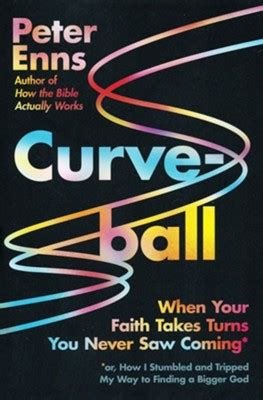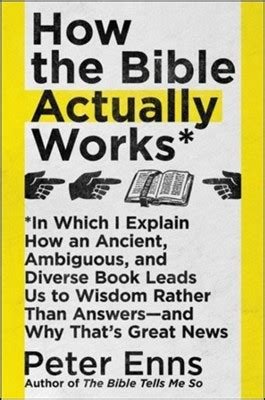I went through the same process other believers go through. I had questions and learned the apologetic answers.
But I now find myself dissatisfied with those apologetic answers. They are lacking. And I'm not alone.
Many believers are questioning the religion we were raised in.
This book describes the process of life throwing curve-balls at us that challenge our faith.
View attachment 50126
“Peter Enns is brilliant at taking the big topics, those Christian ideas that usually scare us or intimidate us or worry us, and then make those very places a meeting place with a God who is bigger and wilder and more wonderful and trustworthy than we ever could have guessed.”—Sarah Bessey, author of Out of Sorts and Jesus Feminist
The author of How the Bible Actually Works and The Bible Tells Me So explains how our model of God and faith must evolve as our understanding of the world deepens—just as the Bible describes it should.
Life throws us “curve balls”—from devastating personal losses to world tragedies. These events often leave us doubting God, the Bible, and our faith. But instead of pushing away our reservations, we should embrace them, Peter Enns argues. A leading biblical scholar and Christian mentor, Enns has never been afraid to question the Bible or Christian beliefs. Such thoughtful inquisitiveness, he argues, is part of God’s plan. He wants us to question, because doing so actually leads to a stronger, lasting faith.
By reframing how we see these events, we allow ourselves to see how the Bible itself showcases this very process and that “treating curve balls as the enemy” is not only counterproductive but thwarts God’s goal of helping us become mature and wise. Enns shares a number of curve balls he’s encountered in his own life and the questions he has pondered. Does God care about the millions of people who never heard the gospel? Could I relate to a God who has created a universe this big? If God is so relatable, constant, and caring, how do we explain quantum physics? He reveals how particular biblical passages have helped him find wisdom, and how they can do the same for us.
As Curveball persuasively shows, God is bigger and more mysterious than anyone’s expectations. We need a faith that can grow just as deeply.
[
I'm wondering if you are getting all your doubts about the Bible, the fundamentals, from Peter Enns? He could be the one throwing you curve balls.
Of course God tests our faith. Bad things happen to good people. But the knowledge and wisdom is there in the Bible. We do learn from experiences and usually have to go through them. Then we confirm what was written, we gain deeper meaning of thise scriptures.
Be careful of writers that detour you away from the Bible and rely only on their experiences. You know what that does? It allows you to do whatever you want, hold onto your sins, remain on your throne, and deceive you in thinking you are growing with God. If that was true, all other religions claim their faith is valid.
Peter Enns holds various significant narratives in Genesis and in the New Testament to be ‘myth’ or ‘legend’ according to its classic definition, and that he acknowledges that the biblical writers mistakenly thought such ‘myths’ corresponded to real past reality.
>> Here is a quite from him:
"Letting go of the need for certainty is more than just a decision about how we think; it’s a decision about how we want to live. When the quest for finding and holding on to certainty is central to our faith, our lives are marked by traits we wouldn’t necessarily value in others: unflappable dogmatic certainty, vigilant monitoring of who’s in and
who’s out, preoccupation with winning debates and defending the faith, privileging the finality of logical arguments, conforming unquestionably to intellectual authorities and celebrities. A faith like that is in constant battle mode…and soon, you forget what faith looks like when you’re not fighting about it.”
Sorry, I disagree with his negative view of our holding onto the certainty of life. Of course we have Christian traits. We see light and darkness in the world, are aware of sin and avoid it. Yes, we do rebuke it in others at the same time we die to our old ways ourselves.
I think he is trying to redefine faith and steer people away from scripture - since it's filled with "man made myths" that we can't rely on.
Hebrews 11:1 tells us that faith is the
assurance and
certainty of things hoped for, things that we can't see.
Check out different translations of that verse.
“Great faith” means you believe ( which means you accept) many of the truths in the Bible; whereas those with “Little faith” are in the beginning of their journey, or just have difficulty accepting many of them. We accept them even when we don't fully inderstand them. Every promise, historical fact, doctrine, prophecy ... the entire Bible!. Some truths are easy to believe while others are difficult. If you believe something that is difficult to believe, then you have great faith. If you do not believe something that is relatively easy to believe, then you have little faith.
Since faith is the conviction or persuasion that something is true, people who have little faith have not been persuaded or convinced of even the basic truths, whereas, people who have great faith have been persuaded or convinced of some of the hard and difficult truths which few people come to believe.
We can then say that we ( who have faith in Christ) are all on the same path, just on different stages of our beliefs. These truths take time to grasp. Also there are different levels of intelligence. Therefore comprehension levels vary. We all don't grasp every doctrine equally. Like all kids in school don't get straight A's. So we must accept that some will have weak faith.
There are other factors that will determine our level of faith.
First of all, Jesus is the Author of our faith and so He divvies out various portions of faith in accordance to His plan.
He obviously gave more faith, talents, spiritual gifts and intelligence to Billy Graham than he did me. That's fine, I wasn't called to be a Pastor to do great things.
Time studying the Word, watering the seed that was planted,
praying, and so one can grow at a faster rate than someone who didn't nourish his spirit.
We have a responsibility to be proactive, learn, attend church, study the Bible, seek God with all our heart, mind and strength.
I hold onto my certainty, I am assured and have a strong conviction about the Word.
It is okay to read commentaries to help us understand the Bible, but nit ti steer us away from it. Some of these writers are liberal, they like to pick and choose which scriptures they like and accept and discard ones that just don't fit into their world view and life.



